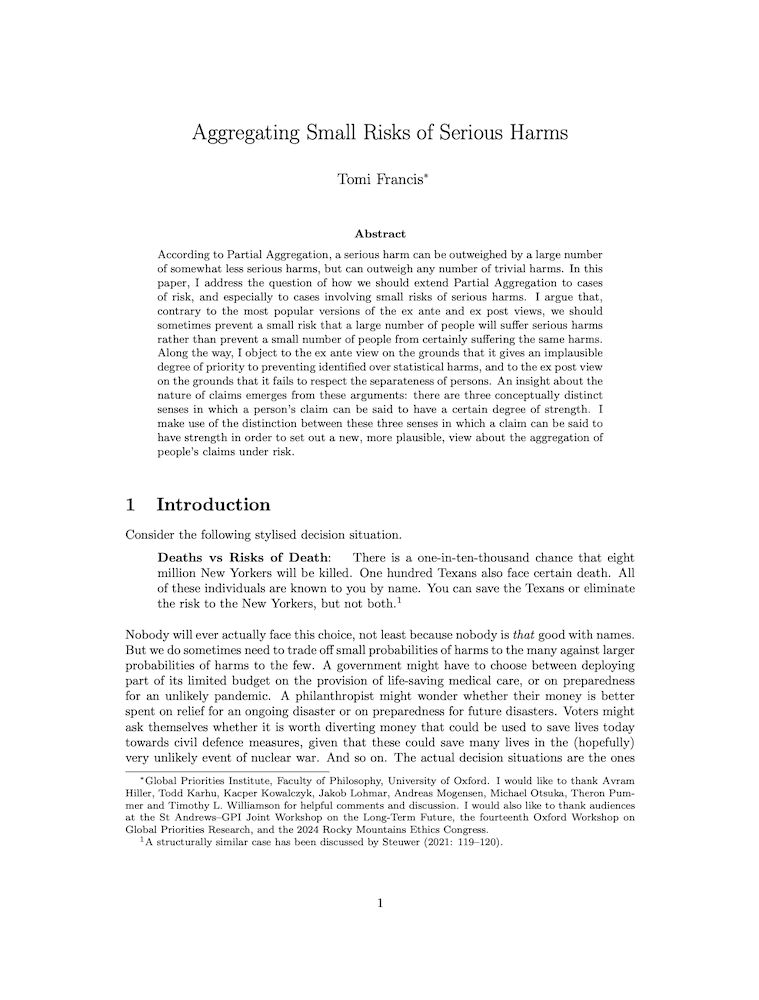Aggregating Small Risks of Serious Harms
Tomi Francis (Global Priorities Institute, University of Oxford)
GPI Working Paper No. 21-2024
According to Partial Aggregation, a serious harm can be outweighed by a large number of somewhat less serious harms, but can outweigh any number of trivial harms. In this paper, I address the question of how we should extend Partial Aggregation to cases of risk, and especially to cases involving small risks of serious harms. I argue that, contrary to the most popular versions of the ex ante and ex post views, we should sometimes prevent a small risk that a large number of people will suffer serious harms rather than prevent a small number of people from certainly suffering the same harms. Along the way, I object to the ex ante view on the grounds that it gives an implausible degree of priority to preventing identified over statistical harms, and to the ex post view on the grounds that it fails to respect the separateness of persons. An insight about the nature of claims emerges from these arguments: there are three conceptually distinct senses in which a person’s claim can be said to have a certain degree of strength. I make use of the distinction between these three senses in which a claim can be said to have strength in order to set out a new, more plausible, view about the aggregation of people’s claims under risk.
Other working papers
The long-run relationship between per capita incomes and population size – Maya Eden (University of Zurich) and Kevin Kuruc (Population Wellbeing Initiative, University of Texas at Austin)
The relationship between the human population size and per capita incomes has long been debated. Two competing forces feature prominently in these discussions. On the one hand, a larger population means that limited natural resources must be shared among more people. On the other hand, more people means more innovation and faster technological progress, other things equal. We study a model that features both of these channels. A calibration suggests that, in the long run, (marginal) increases in population would…
Quadratic Funding with Incomplete Information – Luis M. V. Freitas (Global Priorities Institute, University of Oxford) and Wilfredo L. Maldonado (University of Sao Paulo)
Quadratic funding is a public good provision mechanism that satisfies desirable theoretical properties, such as efficiency under complete information, and has been gaining popularity in practical applications. We evaluate this mechanism in a setting of incomplete information regarding individual preferences, and show that this result only holds under knife-edge conditions. We also estimate the inefficiency of the mechanism in a variety of settings and show, in particular, that inefficiency increases…
The unexpected value of the future – Hayden Wilkinson (Global Priorities Institute, University of Oxford)
Various philosophers accept moral views that are impartial, additive, and risk-neutral with respect to betterness. But, if that risk neutrality is spelt out according to expected value theory alone, such views face a dire reductio ad absurdum. If the expected sum of value in humanity’s future is undefined—if, e.g., the probability distribution over possible values of the future resembles the Pasadena game, or a Cauchy distribution—then those views say that no real-world option is ever better than any other. And, as I argue…

